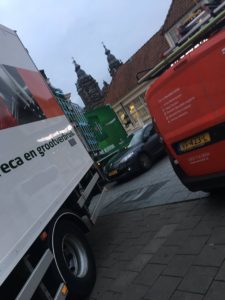The European Union is working on the further liberalisation of road transport by logistics service providers. The question is whether the further liberalisation of shippers transport on own account would not be more effective and yield better results.
Inner cities and residential areas are becoming increasingly congested. Urban logistics must be made cleaner, quieter, safer and preferably unseen. A lot of gains could still be made in respect of traffic to building sites, the catering industry and consumers, and waste flows from cities. But the regulations for transport on own account stand in the way of sharing capacities and consolidation. Why is there no level playing field for one’s transport on own account and road haulage?
Urban logistics
More than two thirds of the transport in European cities is performed with transport on own account. Many companies, particularly in wholesale, building and the food services, prefer to use transport on own account. They see their truck drivers as an extension of their companies and value their daily contact with customers. A helpful truck driver who assists in getting the kegs down into the cellar or a trusted driver who knows how to handle fragile products on the construction site make all the difference. However, getting into the city is not getting any easier, even with transport on own account.
Congested cities
More deliveries from webshops lead to more lorries and delivery vans. Deliveries between consumers via social marketplaces are also on the increase. Two out of three transactions made on the internet are made between consumers via social marketplaces.
At the same time, an increase in the number of ‘nano stores‘, convenience stores in the neighbourhood, has led to more targeted and frequent deliveries. Take me for example, I have five convenience food stores within 500 metres of my home, and two big supermarkets, and, what’s more, the same retailer drives past my door several times a day. It all has to be fresh, fast and in full. It will be just a matter of time before the first neighbourhood shops for building materials appear, and they will also immediately serve as click-and-collect points.
The catering industry wants to serve fresh products every day to restaurant in town. Contractors want to work unhindered… The pressure is on!
Rules
In the old days, you could drive into the city with full trucks. But with increasingly smaller and more frequent deliveries, this is no longer possible. And on top of that, local authorities impose all kinds of annoying rules and environmental zones.
Companies with transport on own account are rightly concerned about urban distribution. Cleaner, quieter, safer and smaller vehicles are the new standard in cities. These vehicles are linked with their on-board computers to local traffic control centres to avoid traffic jams, roadworks and schools. Lorries are friendly guests in the city.
Big investments will shortly be needed to satisfy the requirements of local authorities. Of course, shippers would like to share the costs of these investments with colleagues. Or, shippers would like to bundle transport flows to the same delivery address with other carriers, which also immediately means you can provide a better service to customers. Shippers with transport on own account are fully able to consult directly with their customers about more intelligent delivery. That immediately results in a win-win situation.
Liberalisation
However, the rules for transport on own account stand in the way of cooperation between shippers. You cannot transport each other’s loads just like that. Is contracting out one’s transport in cities the only option then? If so, it will be a very long time before we get our urban logistics in order.
The European Union is working on the further liberalisation of road transport by logistics service providers. The question is whether the further liberalisation of shippers transport on own account would not be more effective and yield better results. I know the answer. A level playing field for transport on own account and logistics service providers is needed.
Walther Ploos van Amstel.

